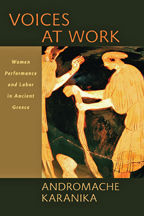Voices at Work: Women, Performance, and Labor in Ancient Greece, by Andromache Karanika
 The CHS Team is happy to share some exciting news from former Fellow Andromache Karanika (University of California). Professor Karanika has just published her latest book, Voices at Work: Women, Performance, and Labor in Ancient Greece, through Johns Hopkins University Press. Andromache Karanika worked on this manuscript, while she was a fellow at the Center in 2009-10.
The CHS Team is happy to share some exciting news from former Fellow Andromache Karanika (University of California). Professor Karanika has just published her latest book, Voices at Work: Women, Performance, and Labor in Ancient Greece, through Johns Hopkins University Press. Andromache Karanika worked on this manuscript, while she was a fellow at the Center in 2009-10.
In ancient Greece, women’s daily lives were occupied by various forms of labor. These experiences of work have largely been forgotten. Andromache Karanika has examined Greek poetry for depictions of women working and has discovered evidence of their lamentations and work songs. Voices at Work explores the complex relationships between ancient Greek poetry, the female poetic voice, and the practices and rituals surrounding women’s labor in the ancient world.
The poetic voice is closely tied to women’s domestic and agricultural labor. Weaving, for example, was both a common form of female labor and a practice referred to for understanding the craft of poetry. Textile and agricultural production involved storytelling, singing, and poetry. Everyday labor employed—beyond its socioeconomic function—the power of poetic creation.
Karanika starts with the assumption that there are certain forms of poetic expression and performance in the ancient world which are distinctively female. She considers these to be markers of a female “voice” in ancient Greek poetry and presents a number of case studies: Calypso and Circe sing while they weave; in Odyssey 6 a washing scene captures female performances. Both of these instances are examples of the female voice filtered into the fabric of the epic.
Karanika brings to the surface the words of women who informed the oral tradition from which Greek epic poetry emerged. In other words, she gives a voice to silence.
“In Voices at Work Karanika successfully adumbrates a diverse array of genres and gendered voices which are muted or silenced in ancient sources and modern scholarship. Her work demonstrates a mastery of a multitude of evidence, from snippets of scholiasts, to fragments from canonical authors, to modern ballads and folksong tradition … Karanika’s monograph deserves a wide audience of those who are interested, as she is, in understanding silence and in knowing ‘how much has been lost, and how we can read our sources with sensitivity to what lies beyond the words’.”
Reviewed by Peter Miller (Texas Tech University) for Bryn Mawr Classical Review (read more)
“In this important and brave book, Andromache Karanika listens out for the voices of ancient women at work – and argues for their influence on ancient Greek poetry. She thereby shifts the study of ancient women from cultural history to literary interpretation.”
Reviewed by Barbara Graziosi (Durham University) for Times Higher Education (read more)
Andromache Karanika is an Associate Professor of Classics at the University of California, Irvine.
